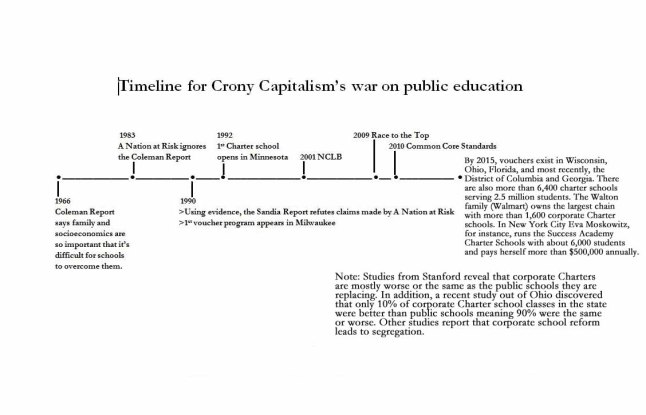The Crony Capitalist War against U.S. Public Education
14MAR
There are several forms of Capitalism in use throughout the world. Economics Help.org defines them and reports that Crony Capitalism is what’s used in the United States. The Age of Crony Capitalism says, “For most of US history, crony capitalism has been in a struggle with free-market capitalism for the heart and soul of the American economy. For the past half century, crony capitalism has been gaining the upper hand.”
In addition, Dr. Gary G. Kohls of Global Resaerch.ca says, “The 12 years of unrestrained crony capitalism during the anti-democracy mis-leadership of Republican presidents Ronald Reagan and George H. W. Bush tricked most of us into naively believing in their fraudulent ‘Trickle-down Economics’.”
Crony Capitalism is a term used to refer to the situation where business success is related to strategic influences with civil servants, politicians and those in authority. It could be used to refer to situations in early twentieth century U.S. where business leaders had to buy off politicians in return for favors (e.g. in popular media: Citizen Kane). Arguably a degree of crony capitalism occurs in countries like China, South Korea and Latin America. The power of the Mafia in Italy is also an example of crony capitalism.
The other forms of capitalism mentioned by Economics Help.org are: Turbo Capitalism (also known as unrestrained capitalism or free market capitalism), Responsible Capitalism, Popular Capitalism, Advanced Capitalism and State Capitalism. Visit the site to learn about the differences. I read them all and I think the two that are highlighted in this paragraph are the best choices for the most people.
In the corporate war against public education—known also as education reform leading to school choice, corporate charter schools and school vouchers—what reports do not support the Crony Capitalist reform movement?
The 1966 Coleman Report—Instead of proving that the quality of schools is the most important factor in a student’s academic success—as its sponsors had expected—the report written by the sociologist James S. Coleman of Johns Hopkins University found that a child’s family background and the school’s socioeconomic makeup are the best predictors. … A better summary of the findings, from Gordon M. Ambach’s perspective, is: Family and socioeconomic backgrounds are so important that it’s difficult for schools to overcome them.
In 1966, the Coleman Report highlighted the impact of poverty on student achievement. In this installment of the Mini-Moments with Big Thinkers series, policy faculty member Jeffrey Henig argues that it’s time to recognize that schools alone cannot ensure that all students succeed equally.
The 1983 report under the Reagan Administration known as A Nation at Risk was characterized by its The Crony Capitalist War against U.S. Public Education | Crazy Normal - the Classroom Exposé:

